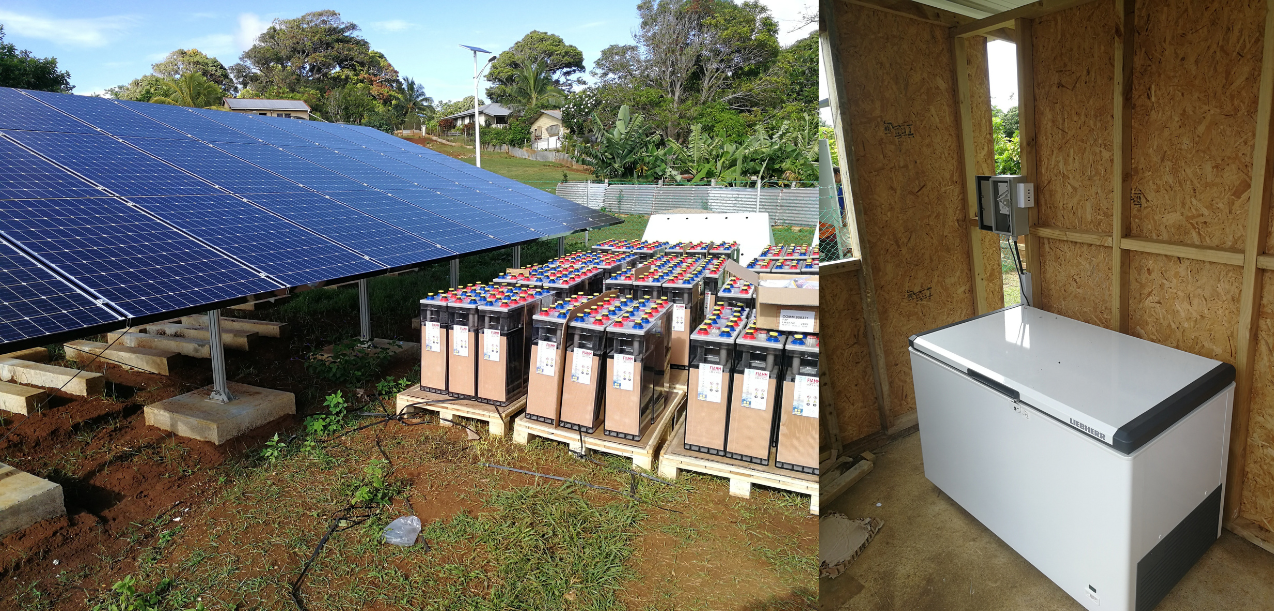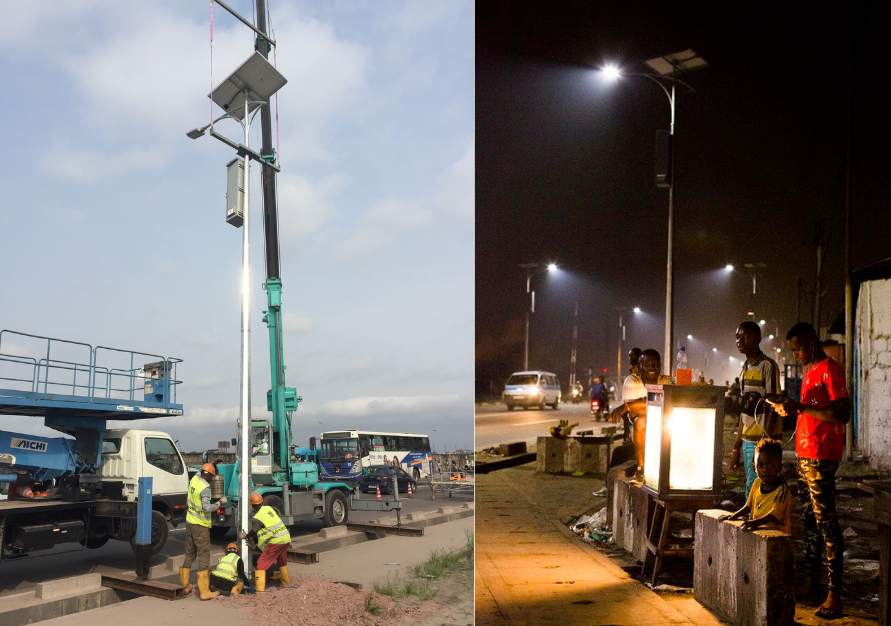Stories
- Home
- Products & Solutions
- Stories
- Delivering Renewable Energy to Fossil Fuel-Dependent Communities
Delivering Renewable Energy to Fossil Fuel-Dependent Communities
Global CO2 emissions have increased drastically over the years — hitting a record high of 33 gigatonnes (Gt) in 20211 — and it was a hot topic at the recent COP26 summit, a UN Climate Change Conference in Glasgow. In light of this, the goal of achieving global net-zero emissions by 2050 might seem like an impossible task. So, the question remains: How can the world move away from coal and toward clean power? The answer lies in electricity sourced from renewable sources.
Over the last few years, Mitsubishi Electric Asia has been partnering organisations such as the World Bank Group and Japan International Cooperation Agency (JICA) to bring sustainable solutions to communities in need. These solutions include high-performance equipment and next-generation power systems that can achieve carbon neutrality, and help global communities employ fuel diversification, which in turn creates reliable power supplies and enhanced energy security.
Providing Equitable Access to Energy
According to the World Bank, only 27 percent of the population in Micronesia’s Chuuk State had access to electricity in 20182. The country’s low power access can be attributed to the complex and dispersed locations of Chuuk’s various island groups, as well as rising fuel costs. For these reasons, the local government places great importance on increasing the country’s access to electricity and reducing its reliance on fossil fuels.
To achieve these, the Chuuk government aims to increase their access to and dependence on renewable energy resources, including solar and wind power. Three areas that needed immediate access to a sustainable and reliable source of electricity were identified — the Chuuk International Airport, the office premises at Chuuk Power Utility Corporation, and the Chuuk Wastewater Treatment Plant.
In partnership with the World Bank Group, Mitsubishi Electric Asia designed, installed, and deployed a complete solution comprising solar photovoltaic systems and customised steel racking across the three locations. Upon reviewing the sites, the team proposed carport solar systems at the Chuuk International Airport, roof top solar systems at the Wastewater Treatment Plant, and shelter solar systems at the Power Utility Corporation.
 [From the left] Picture 1: Chuuk International Airport Carpot,
[From the left] Picture 1: Chuuk International Airport Carpot,
Picture 2: Chuuk Power Utility Coorporation and Picture 3: Chuuk Wastewater Treatment Plant.
These systems are also designed to connect with the country’s microgrid, making it a truly self-sufficient energy system. In this way, the local government can ensure a steady supply of electricity and power for its citizens, even during power disturbances. Furthermore, the grid-connected solar systems work seamlessly with existing Diesel Generator Systems, securing a steady supply of electricity for the local communities on the main island.
With a total installed capacity of 400kW, the solar systems are capable of supplying up to 15 percent of Chuuk’s maximum energy demand in a day. The island was also able to reduce their reliance on fossil fuel powered energy by replacing a significant percentage with solar energy, cutting their CO2 emission by 400 tonnes each year.
Securing Clean Water and Food Supplies
Elsewhere, in the Kingdom of Tonga (Tonga), having reliable access to safe, sustainable water supplies is a growing priority. Tongans depend on diesel-fueled systems to pump groundwater, but they are expensive and difficult to maintain. Furthermore, the Polynesian people’s primary food source is fish, which amplifies the need for Tonga to secure a sustainable supply of fresh fish.
Mitsubishi Electric Asia was engaged to design and install solar water pumping systems and solar freezers for the local communities of the Vava’u and Ha’apai island groups. However, the unique conditions of each site posed an interesting challenge for the engineering team — for example, each well had different water pressures. As such, the Mitsubishi Electric team customised each solar system to work well with their respective well water pressure.
 [From the left] Picture 1: The local community enjoying running water from the installed solar water pumps.
[From the left] Picture 1: The local community enjoying running water from the installed solar water pumps.Picture 2: The Mitsubishi Electric Asia team installing the framework for the solar panels.
 [From the left] Picture 1: The solar panels to power the freezers.
[From the left] Picture 1: The solar panels to power the freezers.Picture 2: These solar-powered freezers hold fresh fish - the communities' primary food source.
To guarantee continued access to safe-to-eat fish even during wet seasons and overcast days, the team also installed Battery Energy Storage Systems (BESS) for solar freezers. A scalable, purpose-built battery solution, the BESS provides an uninterrupted, stable electricity supply and compensates for the durability limitations of renewable energy sources. This stable source of energy also allows the government of Tonga to consistently satisfy energy demands without straining their local power grid.
Lighting the Streets of Congo
And over in the Democratic Republic of the Congo (DRC), the development of the country’s infrastructure — in particular, public lighting — is one of the DRC government’s priorities to improving the local communities’ quality of life. Fortunately, the DRC has immense and varied renewable energy power potential, making it easy for local power suppliers to convert alternative sources of energy into electricity, and to scale up access to electricity for local communities.
In particular, the DRC population needed a way to keep a 12km-long highway brightly lit at night to encourage night-time activities for local communities. Mitsubishi Electric Asia was tasked to install solar-powered streetlights along the highway. The team of engineers designed the streetlamps to comply with South African road guidelines. Most importantly, the streetlights provide the citizens of DRC with a reliable and high-performance source of light at night, increasing road safety and visibility for both night commuters and street hawkers.
 [From the left] Picture 1: Installation of the solar-powered streetlights.
[From the left] Picture 1: Installation of the solar-powered streetlights.Picture 2: Night commuters and street hawkers enjoying the night views.
Innovation for a Sustainable Future
To curtail the devastating effects of climate change, businesses, governments, and communities alike need to accelerate their transition towards carbon neutrality and fuel diversification. As part of Mitsubishi Electric’s contribution to realising sustainability, the global team continuously develops and applies technologies that contribute to reducing environmental burdens. These include the BESS systems and the Bid Liaison and Energy Dispatcher (BLEnDer®) software series, which are designed to support utilities in achieving smarter and more efficient operations.
To find out more about how Mitsubishi Electric Asia can help you actualise your sustainability goals, please contact us through the Sales Inquiry Form.
1IEA, Global Energy Review 2021, 2021
2World Bank, Greener, More Reliable Energy for Micronesia, 7 December 2018


